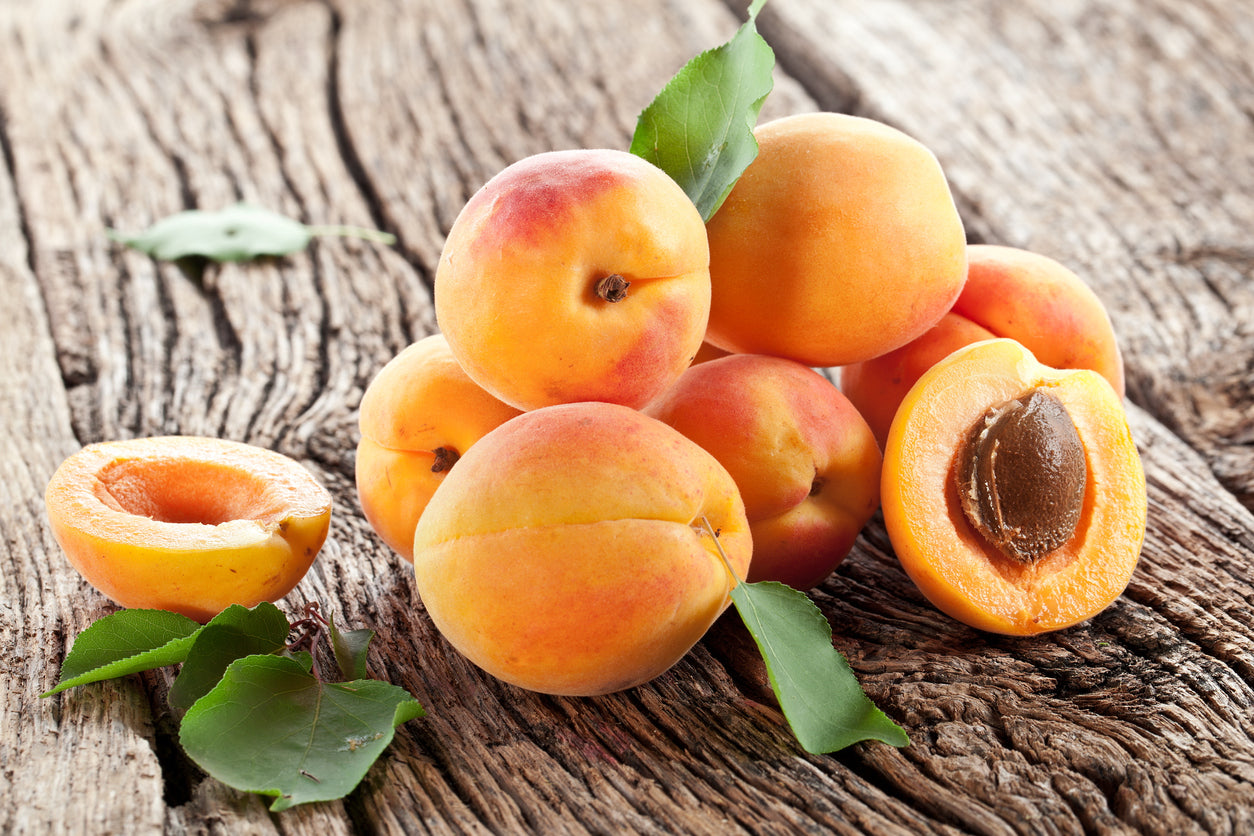Discover 4 valuable benefits of apricots

With their velvety texture and lovely coloring - rosy streaks over a background of deep, golden yellow - ripe apricots resemble small peaches. This is no coincidence. Apricots, botanically known as Prunus armeniaca, belong to the same family as peaches - a group which also includes nectarines, cherries and plums. In fact, apricots are sometimes referred to as “Armenian plums.”
However, the taste of apricots is somewhat richer and more complex than that of peaches. In addition to their luscious flavor, these nutritious fruits feature compounds that can support your overall health in unexpected ways. Let’s look at four of the most surprising benefits of apricots.
Support cardiovascular health with apricots
Believe it or not, the human heart beats an astonishing 2.5 billion times over an average life. So, it shouldn’t be too much to ask that we nourish and support our hard-working “tickers” with the proper nutrition. Apricots - loaded with beneficial polyphenols - can help us accomplish this. For example, apricots are high in chlorogenic acid, a potent antioxidant and anti-inflammatory agent that can help reduce the oxidative stress and inflammation that set the stage for heart disease.
In a new review published in Comprehensive Reviews in Food Science and Food Safety, the authors called chlorogenic acid “one of the most highly functional polyphenolic compounds in the human diet,” and reported that consumption is linked with lower risk of metabolic diseases. Other antioxidants in apricots, including catechins and quercetin, also contribute to heart health by scavenging harmful free radicals that cause oxidative damage.
Finally, apricots contain potassium - an essential mineral that supports normal blood pressure levels - and dietary fiber, which may protect against atherosclerosis by removing cholesterol from the linings of arteries. All in all, apricots are quite the heart-healthy package!
Promote efficient digestion, healthy weight and immunity
Apricots can also help digestion by stimulating gastric juices and activating the smooth muscles of the digestive tract, promoting efficient peristaltic motion. This helps speed the removal of toxins and promote regular bowel movements. In addition, a mere two-apricot serving offers up a gram and a half of dietary fiber.
Researchers say that fiber can create a sense of fullness that may help ward off food cravings and reduce consumption of calorie-laden, low-nutrient “junk” foods. And, soluble fiber in apricots also helps to nourish “friendly” bacteria in the gut microbiome (the community of microbes in the intestinal tract) which in turn supports good immune function and overall health.
Apricots help protect vision
Studies have shown that lutein and zeaxanthin, a pair of yellow-orange plant pigments in apricots, can help protect against age-related macular degeneration (AMD). Characterized by a thinning of the layer of light-sensing cells in the retina, AMD is the leading cause of blindness in Americans over age 65. This is where lutein and zeaxanthin come to the rescue. These natural plant pigments are so effective at shielding the retina from damaging ultraviolet light that some scientists refer to them as “sunscreen for the eyes.”
Other vision-preserving nutrients in apricots include vitamin A - which helps to prevent night blindness - and vitamin E, which is a natural antioxidant that protects the eyes from free radical damage. There’s no doubt about it - every apricot comes with its own supply of vision-protecting nutrients.
Apricots may help protect, moisturize, and exfoliate skin
Natural beauty experts have long credited apricots and apricot oil with skin-moisturizing properties, with scientists confirming that apricot oil is high in gamma linoleic acid (or GLA). And, generous amounts of vitamin C and vitamin A in apricots may help to protect the skin from wrinkles and oxidative damage caused by exposure to sun, environmental toxins and cigarette smoke. Vitamin C in apricots is also an important player in the production of collagen, which is a “must” for maintaining a supple, smooth, healthy complexion.
(If you’d like to check out the ability of apricots to tone, moisturize and generally "glow up" your skin, it’s easy to do. Simply blend two ripe, hulled apricots with two teaspoons of honey and two teaspoons of almond powder. Apply to the face, avoiding the eye area, and leave on for 15 minutes. Then rinse with cold water and pat dry.)
By the way, apricots also offer healthy amounts of vitamin K, B vitamins and trace minerals. Yet each 2-apricot serving contains only a scanty 34 calories, making apricots a great, nutrient-dense "investment."
(Pro tip: Enjoy water-rich apricots after a workout to help rehydrate the body and replenish energy.)
For maximum benefit, eat apricots unpeeled, as the peels are particularly rich in nutrients. You can also snack on convenient dried apricots. While they lack the fluid and vitamin C of their fresh counterparts, dried apricots have more concentrated levels of valuable minerals, such as copper, iron, manganese and phosphorus. However, experts warn that sulfites in dried apricots may trigger asthmatic attacks.
Apricots can be enjoyed out of hand and nibbled “as is” for a revitalizing, refreshing snack. They can also be added to yogurt or oatmeal, sliced into a salad or incorporated into marinades and sauces. However you choose to enjoy them, these delicious, colorful little fruits are a great addition to your healthy diet.
Sources for this article include:






